It All Began in a Place Called Hope
President Bill Clinton
 Bill Clinton was born William Jefferson Blythe III on
August 19, 1946, in the small town of Hope, Arkansas. He was named after his
father, William Jefferson Blythe II, who had been killed in a car accident just
three months before his son was born. Needing to find a way to support herself
and her new child, Bill Clinton's mother, Virginia Cassidy Blythe, moved to New
Orleans, Louisiana, to study nursing. Bill Clinton stayed with his mother's
parents in Hope. There he was surrounded by many relatives who gave him love
and support and who played a significant role in his upbringing. Bill Clinton was born William Jefferson Blythe III on
August 19, 1946, in the small town of Hope, Arkansas. He was named after his
father, William Jefferson Blythe II, who had been killed in a car accident just
three months before his son was born. Needing to find a way to support herself
and her new child, Bill Clinton's mother, Virginia Cassidy Blythe, moved to New
Orleans, Louisiana, to study nursing. Bill Clinton stayed with his mother's
parents in Hope. There he was surrounded by many relatives who gave him love
and support and who played a significant role in his upbringing.
Bill Clinton's grandparents, Eldridge and Edith Cassidy, taught him
strong values and beliefs. They owned a small grocery store just outside of
Hope, and despite the segregation laws of the time, they allowed people of all
races to purchase goods on credit. They taught their young grandson that
everyone is created equal and that people should not be treated differently
because of the color of their skin. This was a lesson Bill Clinton never
forgot.
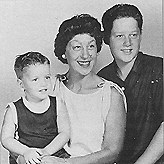 His mother returned from New Orleans with
her nursing degree in 1950, when her son was four years old. Later that same
year, she married an automobile salesman named Roger Clinton. When Bill Clinton
was seven years old, the family moved to Hot Springs, Arkansas. Known for its
natural mineral hot springs, its scenic beauty, and its racetrack, Hot Springs
was bigger than Hope and offered better employment opportunities. Roger
received a higher paying job as a service manager for his brother's car
dealer-ship and Virginia was able to find a better job as a nurse anesthetist.
In 1956. Bill Clinton's half-brother, Roger Clinton, Jr., was born. When his
brother was old enough to enter school, young Bill had his last name legally
changed from Blythe to Clinton. His mother returned from New Orleans with
her nursing degree in 1950, when her son was four years old. Later that same
year, she married an automobile salesman named Roger Clinton. When Bill Clinton
was seven years old, the family moved to Hot Springs, Arkansas. Known for its
natural mineral hot springs, its scenic beauty, and its racetrack, Hot Springs
was bigger than Hope and offered better employment opportunities. Roger
received a higher paying job as a service manager for his brother's car
dealer-ship and Virginia was able to find a better job as a nurse anesthetist.
In 1956. Bill Clinton's half-brother, Roger Clinton, Jr., was born. When his
brother was old enough to enter school, young Bill had his last name legally
changed from Blythe to Clinton.
In 1960, John F. Kennedy was elected President. Two years later, when
Bill Clinton was a senior in high school, he was selected to go to Washington,
D.C., to be a part of Boys Nation, a special youth leadership conference. The
young men of Boys Nation and the young women of Girls Nation were invited to
the White House to meet President Kennedy. Bill Clinton was one of the first in
line to shake President Kennedy's hand in the Rose Garden. That event was one
of the most memorable, important experiences of his youth. After that, he knew
he wanted to make a difference in the lives of the people of America by
becoming President.
That same year, Dr. Martin Luther King, Jr., gave his historic "I Have a
Dream" speech at the foot of the Lincoln Memorial in Washington, D.C. Bill
Clinton watched the speech on television and was so deeply moved by Dr. King's
words that he memorized them. He admired Dr. King's gift for communicating a
clear vision and his ability to pull people together to work toward a common
goal. Dr. King became one of Bill Clinton's heroes.
Inspired by the success of these leaders, young Bill thrived on the hard
work that his academic and extracurricular activities required. As an active
member of his church, he raised money and organized charity events. Most
important, he learned about working with people and being a good citizen. In
his spare time, he enjoyed reading. Some of his favorite books were The
Silver Chalice, The Last of the Mohicans, The Robe, and Black
Beauty.
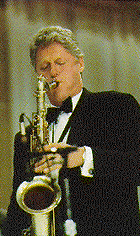 Playing the
saxophone was his favorite pastime. He loved music, practiced every day, and
played in jazz ensembles. Each summer, he attended a band camp in the Ozark
Mountains. His hard work paid off when he became a top saxophone player at his
school and won first chair in the state band's saxophone section. Playing the
saxophone was his favorite pastime. He loved music, practiced every day, and
played in jazz ensembles. Each summer, he attended a band camp in the Ozark
Mountains. His hard work paid off when he became a top saxophone player at his
school and won first chair in the state band's saxophone section.
Bill Clinton recognized that although college would be expensive, it
would give him the education he needed to accomplish his goals. His hard work
in school, combined with his musical ability, earned him many academic and
music scholarships. With the help of those scholarships and loans from the
government, he was able to attend Georgetown University in Washington, D.C. He
chose Georgetown because it had an excellent foreign service program; he was
also excited about going to school in the nation's capital.
While earning his Bachelor of Science degree in International Affairs he
worked as an intern in the office of Arkansas Senator J. William Fulbright.
There he learned how government worked and what it was like to be a politician.
He admired Senator Fulbright for his accomplishments and beliefs.
When Bill Clinton finished college in 1968, he won a Rhodes Scholarship,
which allows select students to study at Oxford University in England. While at
Oxford, he studied government and played rugby. Upon his return to the United
States, he began law school at Yale University. At Yale, he continued to work
hard. He maintained his interest in government by campaigning for a Senate
candidate in Connecticut. He also met Hillary Rodham, whom he would later
marry.
When he graduated from law school in 1973, Bill Clinton returned to
Arkansas to teach law at the University of Arkansas at Fayetteville. There he
could concentrate on his goal of running for political office. In 1974, he had
his first opportunity when he ran for Congress against Republican incumbent
John Paul Hammerschmidt. Although he lost the race, Bill Clinton learned much
about politics and met people who have remained his lifelong friends. Hillary
had joined him in Arkansas and helped him campaign. She also began teaching at
the University of Arkansas. They were married on October 11, 1975.
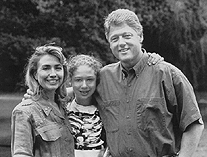 In 1976, Bill
Clinton was elected Attorney General of Arkansas. Two years later, at the age
of thirty-two, he became the youngest governor in the United States. As
governor of Arkansas, he concentrated on improving the state's educational
system and building better roads. On February 27, 1980, the Clintons' daughter,
Chelsea Victoria, was born. The Clintons describe this day as the happiest one
of their lives. In 1976, Bill
Clinton was elected Attorney General of Arkansas. Two years later, at the age
of thirty-two, he became the youngest governor in the United States. As
governor of Arkansas, he concentrated on improving the state's educational
system and building better roads. On February 27, 1980, the Clintons' daughter,
Chelsea Victoria, was born. The Clintons describe this day as the happiest one
of their lives.
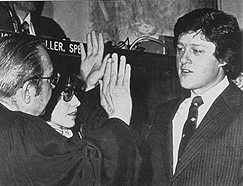 Later that year, in a close election,
Governor Clinton lost the race for a second term to Republican Frank White.
Feeling that he had not accomplished all that he wanted to do, he ran as the
Democratic candidate in the next gubernatorial election. Campaigning throughout
the state, he assured the voters that he would address their needs, and he was
re-elected in November 1982. Later that year, in a close election,
Governor Clinton lost the race for a second term to Republican Frank White.
Feeling that he had not accomplished all that he wanted to do, he ran as the
Democratic candidate in the next gubernatorial election. Campaigning throughout
the state, he assured the voters that he would address their needs, and he was
re-elected in November 1982.
Again, his most important goal as governor was to enhance the quality of
education in the state. He raised teachers' salaries and began a program of
testing students after the third, sixth, and eighth grades. He also encouraged
parents to participate in their children's education. His new educational
standards ensured that every child in Arkansas, regardless of the size or
wealth of his or her community or of family income level, would receive a
quality education.
From August 1986 to August 1987, Governor Clinton served as chairman of
the National Governors' Association. During that time, he led the governors'
efforts to reform the welfare system and the educational systems of the
states.
By the fall of 1991, Governor Clinton believed that the country needed
someone with a new vision and plan, and he decided to run for President. He
also felt that he had the experience and the best ideas for changing our
country for the better. He wanted to strengthen the health care system, to
improve the school system, and, most of all, to bolster the economy and create
new jobs. He brought his message to the country by going door to door, holding
one-on-one talks with people in town hall meetings, and appearing on various
talk shows.
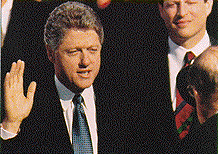 After a long primary
process, Governor Clinton was nominated as the Democratic presidential
candidate. He chose Senator Al Gore, of Tennessee to be his vice-presidential
running mate. Together, Bill Clinton and Al Gore set out by bus to meet the
people of America and to hear about their concerns and their hopes for the
future. They campaigned on the concept of "putting people first'---preserving
the American Dream, restoring the hopes of the middle class, and reclaiming the
future for the nation's children. After a long primary
process, Governor Clinton was nominated as the Democratic presidential
candidate. He chose Senator Al Gore, of Tennessee to be his vice-presidential
running mate. Together, Bill Clinton and Al Gore set out by bus to meet the
people of America and to hear about their concerns and their hopes for the
future. They campaigned on the concept of "putting people first'---preserving
the American Dream, restoring the hopes of the middle class, and reclaiming the
future for the nation's children.
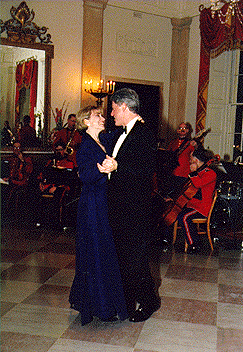 When election day arrived on
November 3, 1992, voters turned out in record numbers to cast their ballots.
Bill Clinton was elected the 42nd President of the United States and Al Gore
the 45th Vice President. They had succeeded in bringing the people together in
their efforts to change our country. When election day arrived on
November 3, 1992, voters turned out in record numbers to cast their ballots.
Bill Clinton was elected the 42nd President of the United States and Al Gore
the 45th Vice President. They had succeeded in bringing the people together in
their efforts to change our country.
Throughout his life, President Clinton has worked to make a difference
in the lives of others. To him, Hope means more than a small town in Arkansas;
it means working to ensure that each American has the opportunity to fulfill
his or her dream.
In 1996, the successful Clinton-Gore team ran for re-election, pledging
continued leadership in building the bridge to the 21st century, meeting the
nation's challenges, and protecting our values. On November 5, 1996, Bill
Clinton was once again elected by the American people to serve a second term as
President of the United States.
During both Administrations, Bill Clinton has worked to lead our country
forward and to ensure that all Americans can make the most of their own lives.
This is an age of enormous possibility -- a time when more Americans will be
able to live out their dreams than ever before. But it is also a time that
poses many challenges. President Clinton believes that to make the most of this
exciting era, we must offer opportunity, demand personal responsibility, and
come together as a national community. |

